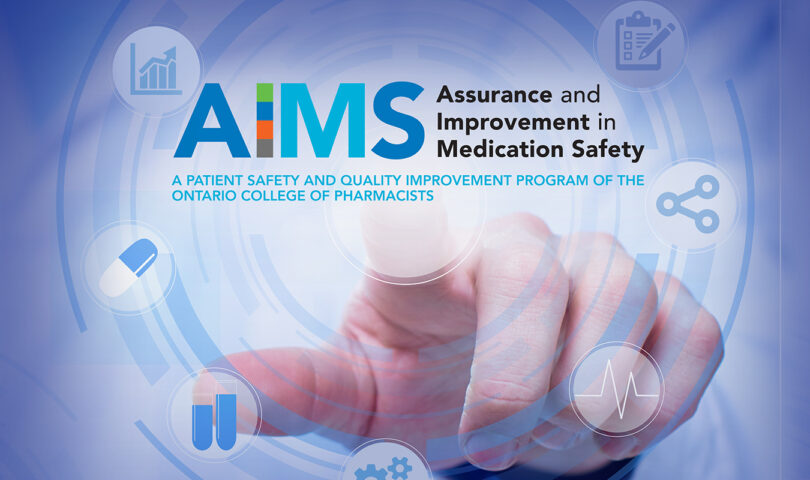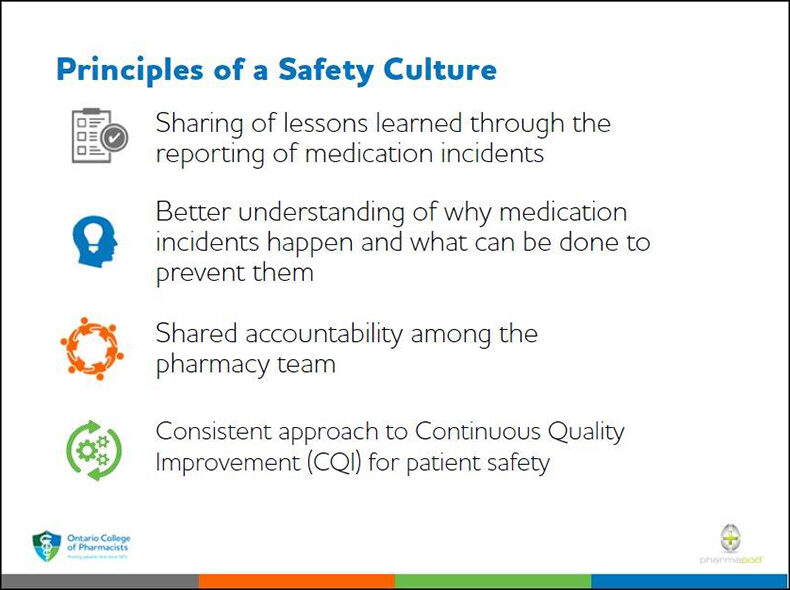
On November 1st, the College announced its plans to move forward with the full implementation of its mandatory medication safety and quality assurance program to all 4,300+ community pharmacies, with the first group of pharmacies onboarding to the program in late November.
The province-wide roll out follows a nine-month preliminary phase in which the College worked with approximately 100 pharmacies, who tested and provided feedback on the program prior to full implementation. Once all community pharmacies have onboarded to the program by mid-2019, it will be the largest program of its kind in Canada.
Now known formally as AIMS (Assurance and Improvement in Medication Safety), the College’s medication safety and quality assurance program supports continuous improvement and puts in place a mandatory consistent standard for medication safety for all pharmacies across the province. The goal of the program is to enhance patient safety and reduce the risk of patient harm caused by medication incidents in, or involving, pharmacies.
Through a better understanding of trends associated with recorded incidents including how and why they occur, the College, pharmacies and health system partners will be able to identify solutions and recommendations to prevent those incidents from recurring and to share these learnings province wide, and beyond.
Moving forward with the full province-wide implementation of our medication safety program is an important milestone for patient safety, not just for the College, but for pharmacy and for the people of Ontario who rely on the safe high-quality care provided by pharmacy professionals every day, says Nancy Lum-Wilson, CEO and Registrar, Ontario College of Pharmacists.
This is the first structured program in Ontario specific to pharmacy that will lead to an improved understanding of the number, type, frequency, impact and cause of medication incidents, she adds. It establishes a standardized approach and expectations related to quality improvement and will help identify trends that will lead to system-wide recommendations to reduce the risk of medication incidents across the province.
The power of data and continuous quality improvement in incident prevention
There has always been an expectation that pharmacies are engaging in continuous quality improvement. The AIMS Program brings structure and clarity around the College’s expectations regarding the handling of medication incidents, including near misses, and how lessons learned from such incidents can be used to improve the safety and quality of pharmacy care.
Once fully onboarded to the AIMS Program, pharmacy professionals will be required to begin anonymously recording medication incidents and near misses via the third party incident-recording platform managed by the College’s program partner, Pharmapod. Utilizing both a preventative approach through proactive reviews of work processes to identify areas of risk and retrospective reviews of specific medication incidents, the program enables pharmacists and pharmacy technicians to learn from medication incidents and better understand why they happen and how they can be prevented.
This is a critical component of the AIMS Program as it will lead to the collection and analysis of medication incident data to support improvements at the pharmacy level. Ultimately, through data sent to the College in an aggregate, non-identifiable form, data will be used to identify trends and areas of risk and provide appropriate guidance to pharmacy professionals across the province.
There is always a patient at the end of every prescription. As part of a patient’s healthcare team, pharmacy professionals have one of the most important roles to play when it comes to patient safety and reducing the risk of preventable harm caused by medication errors, says Melissa Sheldrick, a valued member of the Medication Safety Task Force, patient safety advocate and mother of Andrew Sheldrick, who tragically passed away following a medication error. I am pleased that the College is now moving into this final phase and that it acted quickly yet thoughtfully to develop and implement a program in Ontario that will contribute to safer pharmacy care.
What pharmacies can expect as they onboard
Community pharmacies will be onboarded to the program over the next six to eight months, with the first of several groups of pharmacies commencing their onboarding in late November; the remaining groups are expected to be onboarded between January and May of 2019. Designated Managers (DMs) will receive advance notification prior to the planned onboarding of their pharmacies to allow for team planning and preparation and will be provided additional information and instructions on how to prepare for this process.
Pharmacies can expect to receive ongoing support, guidance and regular information from the College and Pharmapod throughout the entire onboarding process. Training resources will be available through the platform via short web-based modules. Where possible, pharmacies that belong to the same chains will have the same roll-out date to allow for an opportunity to consolidate efforts.
Resources for Pharmacies and Professionals
In addition to the tools and resources that pharmacies will have access to as they onboard to the program, the College has also published a number of other resources. Visit the AIMS Program section of the website under Regulations and Standards where you will find a number of resources including:
- FAQs for pharmacies (related to onboarding and other program/operational details) and general FAQs for both the public and pharmacy professionals
- Information regarding the Supplemental Standard of Practice and Standard of Operation
- Links to previous Pharmacy Connection articles, including the last issue which featured the experience of Ambassador sites as they onboarded to the program
- Ongoing updates from the College
- Background information about the program and our medication safety journey
More information and resources will be added to the website, including additional updates to the FAQs as pharmacies onboard to the program, so it is important that you check back often.
At this time, implementation of the AIMS Program is focused on community pharmacies. Hospitals already have well-established mechanisms related to incident reporting and quality improvement, and should for now continue to engage and participate in incident recording and CQI initiatives.
Please read the information under the Foundations of Safety article in this issue of Pharmacy Connection that confirms the expectations of pharmacy professionals and DMs of both hospital and community pharmacies regarding medication safety and continuous quality improvement.
Questions?
Questions regarding the AIMS Program can be directed to aims@ocpinfo.com.














